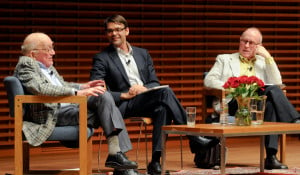“Politics is much harder than physics — we cannot force or coerce the laws of nature to change,” said Sidney Drell, co-founder of the Center for International Security and Cooperation (CISAC), Wednesday evening during a discussion about the politics of nuclear weapons.
Drell was one of three panelists at the event, titled “The Reykjavik Forum: History and a New Vision for Our World’s Future.” The event was part of a two-day series, which featured short videos on the history and challenges surrounding nuclear weapons, a performance of the play “Reykjavik” by Pulitzer Prize-winning author Richard Rhodes and a concluding panel discussion.

Rhodes and Charles Ferguson, president of the Federation of American Scientists, joined Drell on the panel. Ferguson also moderated the discussion.
Rhodes’ play “Reykjavik” recounts — using actual transcripts — the historic 1986 summit meeting between Ronald Reagan and Mikhail Gorbachev. While the summit, which sought to address issues around nuclear weapons and human rights, attained no lasting resolution, both sides hailed it as inducing a breakthrough in relations.
After the 45-minute play, Ferguson began the discussion by highlighting the larger purpose of the event.
“We want to create some videos that go viral like the Kony one,” Ferguson said. “[In this way] we can try to put pressure on political leaders so they feel a greater urgency to act to prevent nuclear terrorism and to take further steps to reduce arms in a responsible way.”
Ferguson offered an optimistic outlook, adding, “Hopefully one day we can reach a nuclear-free world.”
Drell expanded on Ferguson’s points by providing the perspective of a scientist, with extensive involvement in advising and policymaking. Drell previously served as deputy director of the SLAC National Accelerator Laboratory.
“The obligation of the scientific community is to see that the role of technology is used for the benefit of mankind,” Drell said. “We work to guide government leaders. Everything has got to be based upon scientific facts.”
Rhodes provided a more historical view of nuclear politics, tracing the history of nuclear developments and relations. He argued that the idea of “common security — that nations should strive for the safety of all other countries — is key.
According to Rhodes, Reagan had told his advisers prior to the Republican National Convention in 1980 that one of the main reasons he wanted to be elected president was to abolish nuclear weapons.
“But that was where the missing piece of the puzzle came in,” Rhodes said in explaining Reagan’s eventual advocacy of the Strategic Defense Initiative, which would have established an American space-based missile shield to prevent against nuclear attack. “How do you prevent the other side from cheating?”
Drell drew on the play’s atmosphere of mutual suspicion in advocating the idea of “trust, but verify.”
“Reagan was very right in insisting about ‘trust but verify,’” Drell said. “The Russians were cheating during this period [of negotiations] and that’s a fact.”
Drell continued by emphasizing that today’s nuclear threats are different than those faced by superpowers during the Cold War.
“Twenty years later, the question of how do you get rid of nuclear weapons is now focused on how some evil and rogue people can get their hands on weapons to go on a suicide mission,” he said.
With regards to Obama’s current policy on nuclear weapons, Drell described it as a “frustratingly slow march” toward a less nuclear world.
A lively question and answer session followed the discussion, with audience questioning initially focusing on contemporary geopolitics.
“One of the most fundamental changes we have been moving towards is to think of [the issue of] nuclear weapons not as good guys versus bad guys, but that the weapons themselves are ultimately the danger,” Rhodes said in reply to a question on Iran’s nuclear weapons policy. “The last thing anyone wants is a war with Iran, or a war between Israel and Iran, and I don’t think Iran wants that either.”
Other questions concerned issues from the disposal of nuclear waste to the handling of nuclear weapons in states that broke away from the USSR in 1991.
“It is fantastic living so close to Stanford where there are so many people contributing to advances in peace and technology,” said audience member Mark Weiss, a community member. “People like Dr. Drell are legends in their fields and are such a great resource.”
The Federation of American Scientists, the National Center for New Plays, the Fund for Peace Initiatives, CISAC, the Center for Ethics in Society and Stanford Continuing Studies co-sponsored the event.
The Ethics and War series will conclude next Wednesday with a discussion of ethical challenges yet to come.